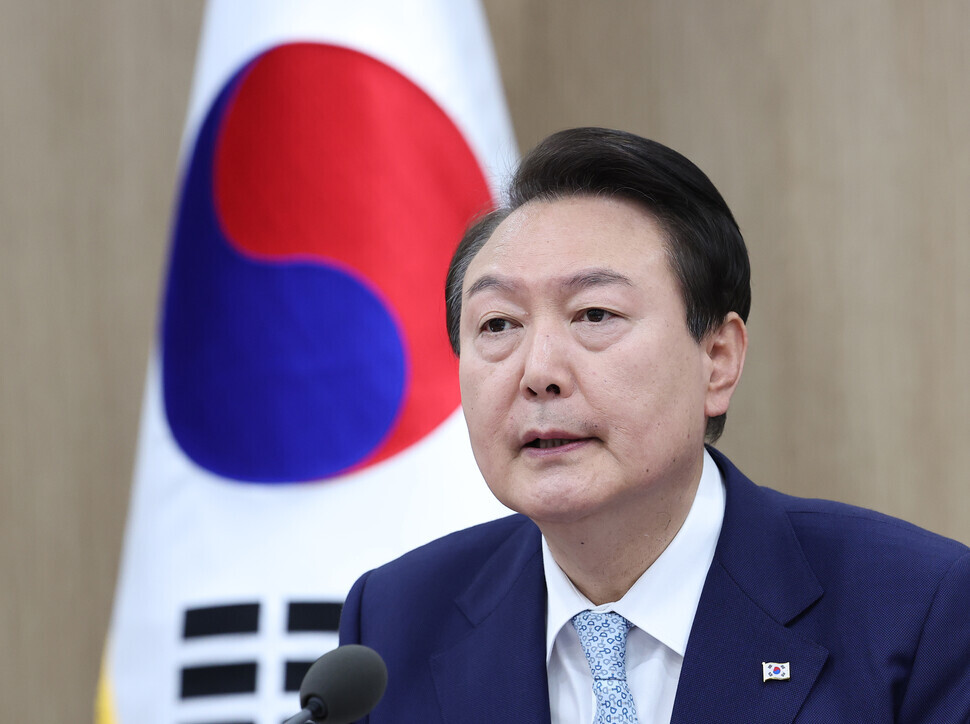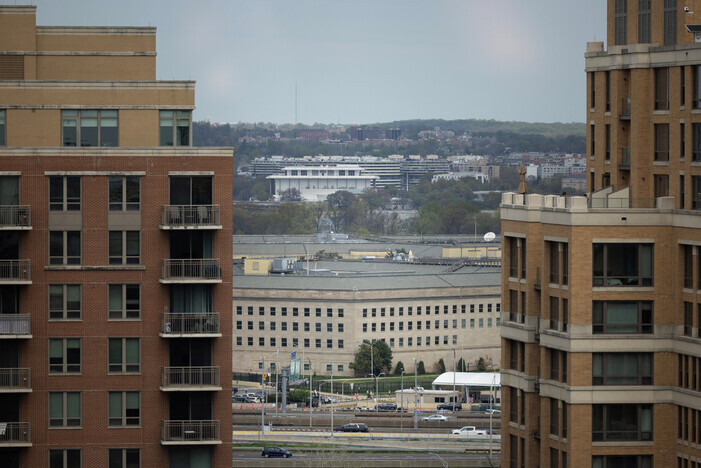hankyoreh
Links to other country sites 다른 나라 사이트 링크
Weeks until US visit, Yoon must contend with likely violation of Korean sovereignty by key ally

Recently leaked classified documents reveal that the CIA appears to have been spying on the National Security Office (NSO) in Seoul, the control tower of South Korea’s security decision-making. The revelation comes mere weeks before President Yoon Suk-yeol’s planned state visit to the US on April 26, and is expected to have repercussions for the South Korea-US alliance.
The confidential US government documents, now leaked to the outside world, include details about the situation in Ukraine and Russian military trends reported to US military leaders around February, trends coming from China related to the war in Ukraine, North Korean nuclear and missile developments, and the situation in the Middle East.
The leaked documents covered intelligence collected by multiple key US intelligence agencies including the CIA, National Security Agency (NSA), National Reconnaissance Office, and the Defense Intelligence Agency.
US officials stated that certain information in the leaked documents differed from original versions and were manipulated, such as by exaggerating the number of Ukrainian soldiers killed in the war while minimizing the number of Russian soldiers killed.
Nevertheless, most of these documents have been confirmed to be genuine intelligence reports that were leaked from the US Department of Defense.
Particularly noteworthy is the discovery that the US has secretly been collecting intelligence on allies such as South Korea, the UK, Canada, and Israel. Those concerning the illicit interception of talks at South Korea’s NSO appear to be among the most serious of revelations.
The classified documents showed that the government in Seoul was under considerable pressure and put in a difficult position over whether to provide lethal weapons to Ukraine. According to the leaked reports, then-head of the NSO, Kim Sung-han, was concerned that public opinion could see South Korea accepting this US request as a quid pro quo for a state visit.
The documents show that Kim suggested possibly selling the munitions to Poland, which controls the main weapons supply routes, since it was Washington\'s goal to get the material to Ukraine quickly. It was also revealed that Im Ki-hun, presidential secretary for national defense, had promised to come to “a final stance by March 2.”
In addition, Lee Mun-hee, foreign affairs secretary at the time, said that South Korea “was not prepared to have a call between the heads of state” without having a clear position on the issue, the documents revealed, along with Lee’s concerns about the possibility of US president Biden pressuring president Yoon on the issue, the document said.
Coincidentally or not, both Kim Sung-han and Lee Mun-hee, whose names appear in the documents, resigned at the end of last month, about one month before Yoon\'s scheduled state visit to the US.
If the CIA has indeed succeeded in wiretapping areas around the NSO, which operates within South Korea’s presidential office, this represents a serious infiltration of the country’s main diplomatic and security command tower.
Although South Korea and the US are close allies, if Washington has been secretly spying on internal discussions related to sensitive issues on which the two allies have different interests, this would inevitably greatly damage South Korea’s national interests.
There is also a strong possibility that illegal wiretapping was conducted within South Korean territory, which would doubtlessly spark controversy over an infringement of sovereignty.
The New York Times paraphrased a South Korean weapons expert as saying, “The mere fact of the spying taking place, leaving aside what it might uncover, is a damaging revelation.”

But this isn’t the first time the US has spied on foreign government agencies or officials. In 2013, news broke that the NSA was involved in carrying out extensive wiretapping of both enemies and allies.
With the revelations made by Edward Snowden, who leaked classified information from the NSA when working there, evidence surfaced that the US had been spying on German Chancellor Angela Merkel for over 10 years, going as far as tapping her phone calls. Besides this, it was also revealed that the US was spying on the embassies of allied countries.
The 2013 leaks also revealed that the NSA designated South Korea as a key target country for intelligence gathering back in 2007. Even then, the Blue House was believed to be the main target for such intelligence gathering activity.
The latest leaks have resulted in the exposure of intelligence sources and increased difficulty in interacting with foreign intelligence agencies. Regarding Russia, for example, the documents show that US intelligence gathering capabilities have even been able to infiltrate Moscow’s military intelligence agency, the GRU.
A senior US intelligence official told the New York Times that the leaks are “a nightmare for the Five Eyes,” referring to the intelligence-sharing alliance comprising the US, UK, Canada, Australia and New Zealand.
The focus is also on how the US will try and explain the situation to countries that it has illegally been spying on, including South Korea. Back in 2013, President Barack Obama apologized to Merkel, although he maintained he was personally unaware of the wiretapping.
Even though after the 2013 leaks a reform proposal for US wiretapping programs was proposed and the law changed, a repeat of a similar controversy could ultimately not be avoided.
The confidential documents were first posted on Discord, a chat platform mainly used by gamers, from late February to early March, and then spread to Telegram and Twitter.
The US Department of Justice has launched an investigation to assess the details surrounding the leaks. Washington believes that Russia may be responsible.
By Lee Bon-young, Washington correspondent
Please direct questions or comments to [english@hani.co.kr]

Editorial・opinion
![[Guest essay] Maybe Korea’s rapid population decline is an opportunity, not a crisis [Guest essay] Maybe Korea’s rapid population decline is an opportunity, not a crisis](https://flexible.img.hani.co.kr/flexible/normal/500/300/imgdb/original/2024/0430/9417144634983596.jpg) [Guest essay] Maybe Korea’s rapid population decline is an opportunity, not a crisis
[Guest essay] Maybe Korea’s rapid population decline is an opportunity, not a crisis![[Column] Can Yoon steer diplomacy with Russia, China back on track? [Column] Can Yoon steer diplomacy with Russia, China back on track?](https://flexible.img.hani.co.kr/flexible/normal/500/300/imgdb/original/2024/0430/1617144616798244.jpg) [Column] Can Yoon steer diplomacy with Russia, China back on track?
[Column] Can Yoon steer diplomacy with Russia, China back on track?- [Column] Season 2 of special prosecutor probe may be coming to Korea soon
- [Column] Park Geun-hye déjà vu in Yoon Suk-yeol
- [Editorial] New weight of N. Korea’s nuclear threats makes dialogue all the more urgent
- [Guest essay] The real reason Korea’s new right wants to dub Rhee a founding father
- [Column] ‘Choson’: Is it time we start referring to N. Korea in its own terms?
- [Editorial] Japan’s rewriting of history with Korea has gone too far
- [Column] The president’s questionable capacity for dialogue
- [Column] Are chaebol firms just pizza pies for families to divvy up as they please?
Most viewed articles
- 1‘We must say no’: Seoul defense chief on Korean, USFK involvement in hypothetical Taiwan crisis
- 2After election rout, Yoon’s left with 3 choices for dealing with the opposition
- 3Why Kim Jong-un is scrapping the term ‘Day of the Sun’ and toning down fanfare for predecessors
- 4Two factors that’ll decide if Korea’s economy keeps on its upward trend
- 5Noting shared ‘values,’ Korea hints at passport-free travel with Japan
- 6AI is catching up with humans at a ‘shocking’ rate
- 7[Correspondent’s column] The US and the end of Japanese pacifism
- 8A week of protests lays bare many inherent vices of Korean health care system
- 9[Editorial] As it bolsters its alliance with US, Japan must be accountable for past
- 10[Editorial] Japan’s rewriting of history with Korea has gone too far